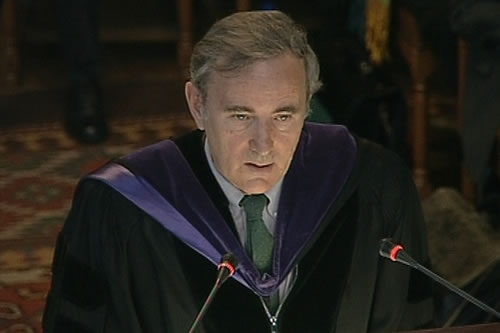Home
SERBIA AND MONTENEGRO WILL NOT GIVE UP ITS LAWSUIT AGAINST NATO
Belgrade wants the International Court of Justice to "shed some light" on the status of the Federal Republic of Yugoslavia under international law between 1992 and 2000.
 Tibor Varady, chief legal representative of Srbija and Montenegro
Tibor Varady, chief legal representative of Srbija and Montenegro The Government of Serbia and Montenegro will not give up the proceedings instituted five years ago by Belgrade’s former government against eight NATO member states. It wants the International Court of Justice to decide whether it has jurisdiction to hear the case; and if it decides it does, Belgrade expects the Court to start hearings on the merits of the case: the legality of the use of force and breaches of the Convention on Genocide.
This is how Tibor Varady, chief legal representative of Serbia and Montenegro, explained the position of his government today, following two days of hearings before the International Court of Justice (ICJ) during which NATO country representatives intimated in various ways that Belgrade had "given up" on the case and that it had "admitted" there were no grounds for the World Court to assert its jurisdiction and the "merits of the case no longer existed."
Varady said Serbia and Montenegro expected the Court to shed some light on the status of the former Federal Republic of Yugoslavia between 1992 and 2000 and to determine the state’s position in the UN and other international organizations, in particular its position vis-ŕ-vis the Statute of the International Court of justice and the Convention on the Prevention and Punishment of the Crime of Genocide.
Challenging the jurisdiction of the International Court of Justice in this case, legal representatives of the NATO countries used the same arguments that the FRY used in vain in 2002 when it tried to challenge the jurisdiction of the Court in the case brought against it by Bosnia and Herzegovina eleven years ago. The basic argument offered by Belgrade then was that in November 1999, the FRY joined the UN as a "new member state" and that only afterwards did it ratified the ICJ Statute ad the Convention on Genocide. Therefore, it cannot be a party to a lawsuit instituted by BH in 1993, when the FRY was not in the UN, not a member of the ICJ, and not a signatory of the Convention on Genocide.
The International Court dismissed Belgrade's arguments last year, noting that the admission of the FRY into the UN in 2000 does not affect retroactively the sui-generis position that Yugoslavia enjoyed until then vis-ŕ-vis the UN, the ICJ Statute and the Convention on Genocide. Serbia and Montenegro now wants the International Court to give a more precise definition of the "sui-generis" position of the FRY between 1992 and 2000 and to state "what is and which is the Yugoslavia" whose membership in international organizations and treaties has never been terminated or suspended.
Noting that in their arguments many NATO member states mentioned that in the past few years there has been a "significant improvement in the relations" between Serbia and Montenegro and the Euro-Atlantic alliance, Varady expressed his government’s desire for "the trend to continue," despite the lawsuit that Belgrade is unwilling to drop. Pointing to the changes that Serbia and Montenegro has undergone in the meantime, Varady noted that "the parties in the proceedings are not the same as the parties in the conflict" in the spring of 1999.
The hearings on the jurisdiction of the International Court of Justice and the admissibility of the case brought by the FRY in 1999 will continue tomorrow with another round of arguments by the parties.
